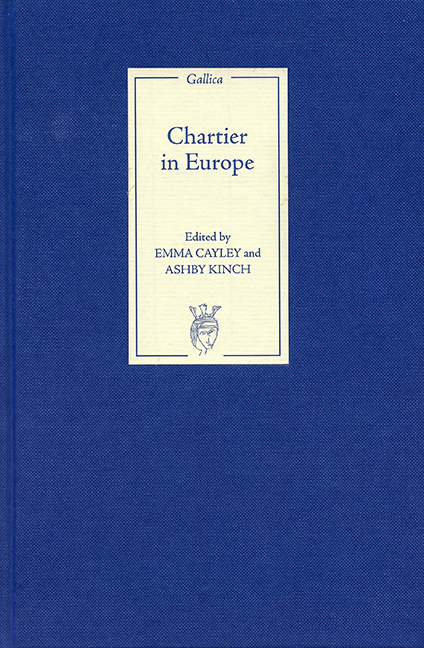Book contents
- Frontmatter
- Contents
- Foreword
- List of Contributors
- Acknowledgements
- List of Abbreviations
- Introduction
- Part I Authorising Chartier
- 1 Boethius as Model for Rewriting Sources in Alain Chartier's Livre de l'Esperance
- 2 ‘Vox Dei, vox poetae’: The Bible in the Quadrilogue invectif
- 3 ‘Car rompre vault pis que ployer’: Proverbial Pleasure in La Belle Dame sans mercy
- 4 Alain Chartier's Livre des Quatre Dames and the Mechanics of Allegory
- Part II Transmitting Chartier
- Part III Translating Chartier
- Bibliography
- Index
- Miscellaneous Endmatter
2 - ‘Vox Dei, vox poetae’: The Bible in the Quadrilogue invectif
from Part I - Authorising Chartier
Published online by Cambridge University Press: 24 October 2017
- Frontmatter
- Contents
- Foreword
- List of Contributors
- Acknowledgements
- List of Abbreviations
- Introduction
- Part I Authorising Chartier
- 1 Boethius as Model for Rewriting Sources in Alain Chartier's Livre de l'Esperance
- 2 ‘Vox Dei, vox poetae’: The Bible in the Quadrilogue invectif
- 3 ‘Car rompre vault pis que ployer’: Proverbial Pleasure in La Belle Dame sans mercy
- 4 Alain Chartier's Livre des Quatre Dames and the Mechanics of Allegory
- Part II Transmitting Chartier
- Part III Translating Chartier
- Bibliography
- Index
- Miscellaneous Endmatter
Summary
Following in the footsteps of Jean de Meun, Alain Chartier had understood that it was possible to bring forth ‘la diffinitive sentence’ (the definitive answer) from ‘contraires choses’ (contrary things). So he chose the elaborate framework of a tempestuous debate, of a ‘quadrilogue’ between Lady France and her three sons, to mobilise his compatriots in 1422, that darkest of years. Respected clerk and secretary of the dauphin Charles, maistre Alain enjoyed a certain reputation; but Charles was still only the ‘roi de Bourges’ (king of Bourges), reduced to exile with his followers, while the English king Henry V had obtained political control over the country, thanks to the treaty of Troyes (21 May 1420). The urgency of the need to speak out, for Chartier, was equalled only by the difficulty of doing so. All necessary means had to be employed in order to confer on the Quadrilogue invectif the persuasive weight of auctoritas.
Chartier's clerical authority in the Quadrilogue is two-fold, based at once on classical erudition and on biblical wisdom. My investigation here builds on work undertaken by Jean-Claude Mühlethaler. I focus on how our Norman clerk, forging a dual persona of prophet and preacher, deploys biblical discourse in order to lend authority to his ‘petit traictié’ (short treatise), both directly and through the agency of his characters.
The Authority of the Prophet
Immediately after the opening paragraph of the Quadrilogue addressed to his readers, Chartier embarks upon a meditation underpinned by the sovereign authority of God: all human power depends on ‘la divine et infinie puissance’ (the divine and infinite power) of the Creator (1). The fate of the nation, referred to in the first person plural, is at stake. Alain swiftly emerges from this ‘nous’, through his ability to determine the real cause of the catastrophe: ‘nous imputons a Fortune … la juste venjance que Dieu prent de noz faultes’ (4: we ascribe to Fortune … the just vengeance that God exacts for our faults). Even if ‘les jugemens de Dieu … sont une abisme parfonde ou nul entendement humain ne sceit prendre fons’ (4: God's judgements … are a deep chasm where human understanding must fall short), the clerk escapes at least in part from human impotence, and it is this exceptional status that is the cornerstone of his authority.
- Type
- Chapter
- Information
- Chartier in Europe , pp. 31 - 44Publisher: Boydell & BrewerPrint publication year: 2008

